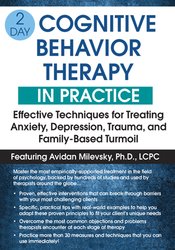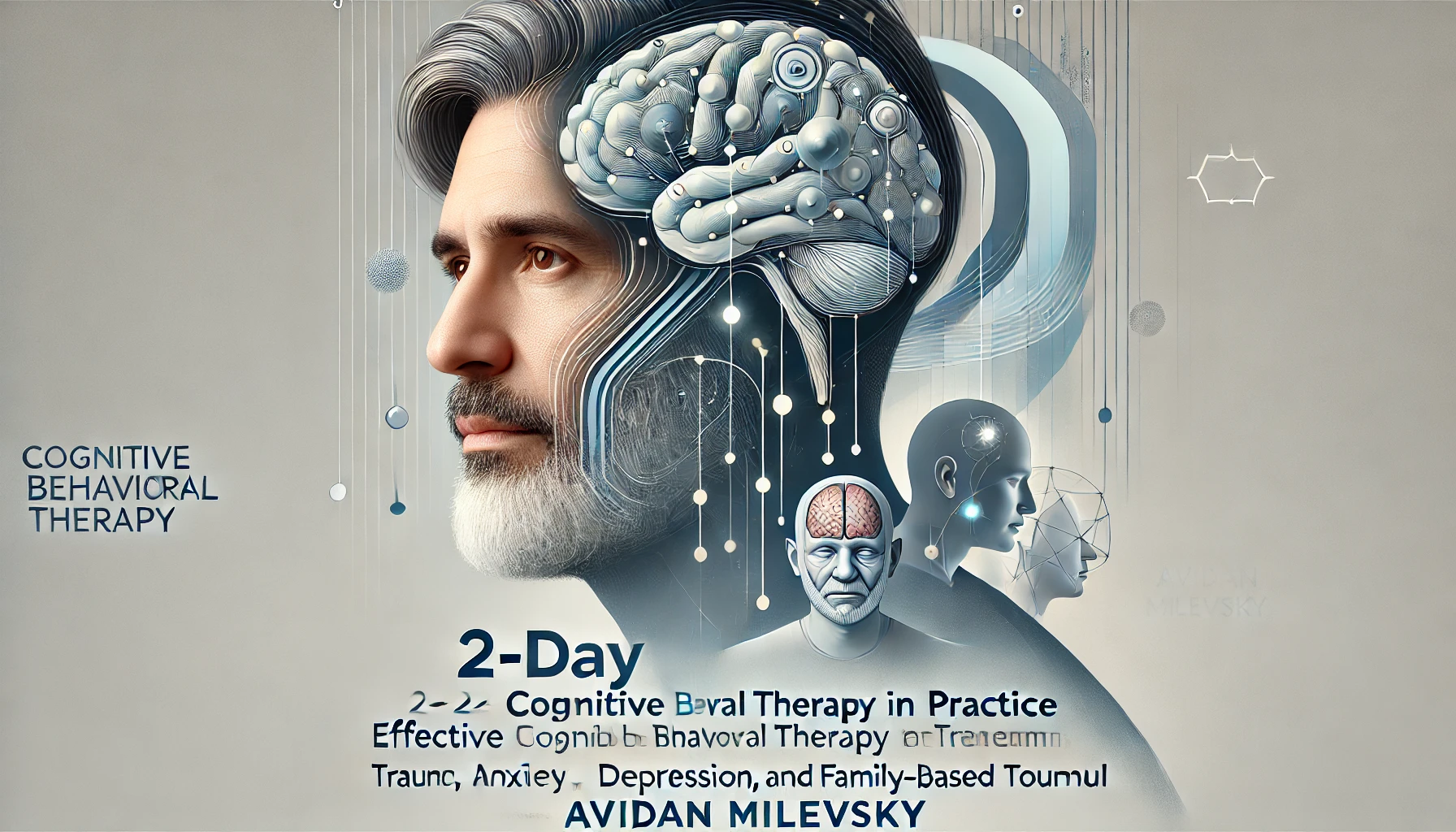2-Day -Cognitive Behavioral Therapy in Practice -Effective Techniques for Treating Anxiety, Depression, Trauma, and Family-Based Turmoil – Avidan Milevsky
2-Day -Cognitive Behavioral Therapy in Practice -Effective Techniques for Treating Anxiety, Depression, Trauma, and Family-Based Turmoil – Avidan Milevsky…
Overview
Discover the Best Learning with 2-Day -Cognitive Behavioral Therapy in Practice -Effective Techniques for Treating Anxiety, Depression, Trauma, and Family-Based Turmoil – Avidan Milevsky
WisMentor is your ultimate destination for online learning. Explore "2-Day -Cognitive Behavioral Therapy in Practice -Effective Techniques for Treating Anxiety, Depression, Trauma, and Family-Based Turmoil – Avidan Milevsky" by top authors and instructors, designed to transform your skills and career. Start now and unlock your potential!
Salepage check: 2-Day -Cognitive Behavioral Therapy in Practice -Effective Techniques for Treating Anxiety, Depression, Trauma, and Family-Based Turmoil
Author: Avidan Milevsky
- Faculty:
- Avidan Milevsky
- Duration:
- 12 Hours 8 Minutes
- Format:
- Audio and Video
- Copyright:
- Dec 04, 2019
Description
Do you have a client who everyone else has given up on?
They’ve seen multiple therapists; without the relief, they want and deserve. Maybe you feel stuck with this client – and at this point, even the client believes they are not capable of getting better.
You can offer them hope…with practical interventions that are proven to WORK!
Evidence points to Cognitive Behavioral Therapy (CBT) as one of the most effective treatments for many chronic, recurring, and challenging mental health conditions.
If you’ve been using CBT skills and aren’t getting the response you expected, then don’t miss this opportunity to master a fresh set of clinical tools and skills that will transform your practice. This is NOT a “one-strategy-fits-all” approach.
This CBT course offers you a complete collection of practical ways to integrate this empirically supported approach in your very next session.
- Proven, effective techniques you can use with your clients for the most common presenting problems … including anxiety, depression and trauma.
- A collection of specific, practical tips with real-world examples to help you adapt these proven principles to fit your client’s unique needs … building a strong, collaborative relationship with them and shifting their negative beliefs without your client feeling disrespected or shamed.
- Example script examples to masterfully overcome the most common objections and problems therapists encounter at each stage of therapy.
Handouts
| Manual – 2-Day Cognitive Behavior Therapy in Practice (3.2 MB) | 67 Pages | Available after Purchase |
Outline
CBT Checklist
- The cognitive model
- Measurements and assessments
- Short term interventions
- Demystifying the process
- Accountability and independence
- Collaboration
- Education
- Continuity of sessions
- Establishing a therapeutic alliance
- Research risks and limitations
Techniques Used in CBT
- Empirical practice
- Case conceptualization roadmap
Cognitive Tools and Strategies
- Session agenda and assessment
- Automatic thoughts
- Core beliefs, assumptions, reactions, and coping
- Situational reactions
Modifying Rigid Cognitions and Core Beliefs
- Confronting automatic thoughts
- Cognitive distortions and automatic thoughts
- Modifying core beliefs
Behavioral Tools and Strategies
- Behaviorism in practice
- Systematic desensitization
- Hierarchy of fears
- Emotional and behavioral exposure
- Relaxation, breathing and mindfulness
- Goal setting and progress check
- Positive engagement and communication strategies
- Target behavior selection
- Behavior assessment
- Homework tasks
Offshoot Models and Third Wave Approaches
- Dialectical Behavior Therapy
- Acceptance and Commitment Therapy
- Schema Therapy
- Mindfulness-Based CBT
CBT for Depression and Suicide
- Risk assessment strategies for suicidal ideation
- Cognitive model and modifying negative cognitions
- Behavioral activation
- Sleep hygiene
- Activity monitoring and scheduling
- Gratitude and meaning
CBT for Anger
- Cognitive model of anger
- Symptom management
- The zone of intervention
CBT for Anxiety
- Cognitive model of anxiety
- OCD, Generalized Anxiety, Social Anxiety, Panic Disorders, Phobias
- Hierarchy work
- Subjective Units of Distress Scale
- Exposure and Response Prevention
- Intrusive thoughts metacognitive strategies
- Behavioral experiments
CBT for Trauma and PTSD
- Neurological and memory foundations of trauma
- Prolonged Exposure
- Trauma narratives
- Childhood memories, traumas and core beliefs
- Experiential techniques
Family Turmoil and the Cognitive Model
- Family-based core beliefs
- The use of family support
- The Parental Context
Application to Clinical Practice with Case Studies and Role Plans
Faculty
Avidan Milevsky, PhD, LCPC Related seminars and products: 2
Avidan Milevsky, PhD, LCPC, has over 20 years of experience specializing in the broad application of cognitive behavioral interventions for multiple client difficulties. He is an associate professor of psychology at Ariel University and a psychotherapist at The Center for Mental Health in Bet Shemesh, Israel. He also serves as a psychotherapist at Wellspring Counseling in Towson, MD.
His clinical research has produced over 100 conference presentations, more than 30 papers in peer-reviewed journals, and six books including Will I Ever be Happy Again, Understanding Adolescents for the Helping Professional, and Sibling Issues in Therapy.
Dr. Milevsky has lectured to audiences in the United States, Canada, South America, Europe, and the Middle-East on various topics including cognitive behavioral interventions for individual and family issues, parenting, sibling relationships, and the intersection between spirituality and mental health.
He has been interviewed by national media about his work including stories in The Washington Post, The Wall Street Journal, The Associated Press, Real Simple, and Allure magazine. Additionally, Dr. Milevsky is a columnist for Psychology Today and The Huffington Post on well-being issues. He has been a guest expert on TV and radio including an appearance on Public Radio International’s “The Takeaway.”
Speaker Disclosures:
Financial: Avidan Milevsky has an employment relationship with Wellspring Counseling. Towson, MD. He is an associate professor of Psychology at Ariel University in Israel. He is the executive director of The Center for Mental Health in Israel. Dr. Milevsky receives a speaking honorarium from PESI, Inc.
Non-financial: Avidan Milevsky is a member of the American Psychological Association.
About 2-Day -Cognitive Behavioral Therapy in Practice -Effective Techniques for Treating Anxiety, Depression, Trauma, and Family-Based Turmoil – Avidan Milevsky and Our Expert Authors
2-Day -Cognitive Behavioral Therapy in Practice -Effective Techniques for Treating Anxiety, Depression, Trauma, and Family-Based Turmoil – Avidan Milevsky is part of our extensive collection of over 70,000 premium courses at WisMentor. Created by renowned authors and industry leaders, this course is tailored to provide cutting-edge knowledge and actionable insights.
Why Choose WisMentor?
- 🌟 Access courses from world-renowned authors.
- 📚 Wide range of topics to suit your professional and personal growth needs.
- 💼 Lifetime access and flexible learning options.
Key Features of 2-Day -Cognitive Behavioral Therapy in Practice -Effective Techniques for Treating Anxiety, Depression, Trauma, and Family-Based Turmoil – Avidan Milevsky:
- ✅ Comprehensive content covering essential topics.
- ✅ Evidence-based methodologies and practical examples.
- ✅ Learn at your own pace with expert guidance.
How to Access Your Course?
Getting started is easy:
- 📩 Receive an instant download link via email.
- 🌐 Access your course anytime through your account dashboard.
- 📱 Compatible with all devices for a seamless experience.
Need Help?
Our dedicated support team is here to assist you. Visit our Contact Us page or reach out via email for any queries or assistance.
More from Our Collection:
Don’t miss the opportunity to explore more courses from top authors and enrich your learning journey at WisMentor. Find your next course now and take your skills to the next level.
Curriculum
FAQs
Requirements
- Educational Background: Participants should possess a foundational understanding of psychology or counseling principles.
- Professional Experience: Ideal for practicing therapists, counselors, social workers, and mental health professionals seeking to expand their CBT techniques.
- Technical Needs: Reliable internet access for online modules and virtual interactions.
Features
- Certification: Upon completion, receive a certificate recognizing your proficiency in CBT practices.
- Flexible Access: Online availability allows participants to learn at their own pace.
- Interactive Learning: Engaging activities, case studies, and real-world scenarios to reinforce learning.
- Expert Instruction: Led by seasoned professionals with extensive experience in CBT applications.
- Comprehensive Curriculum: In-depth modules covering effective CBT techniques for treating anxiety, depression, trauma, and family-related challenges.
Target audiences
- Mental Health Professionals: Therapists, counselors, psychologists, and social workers aiming to enhance their therapeutic repertoire.
- Healthcare Providers: Medical professionals interested in integrating CBT into patient care.
- Graduate Students: Individuals pursuing advanced degrees in psychology or counseling.
- Educators: Teachers and academic professionals focusing on mental health education.


